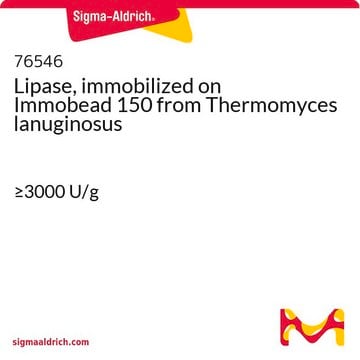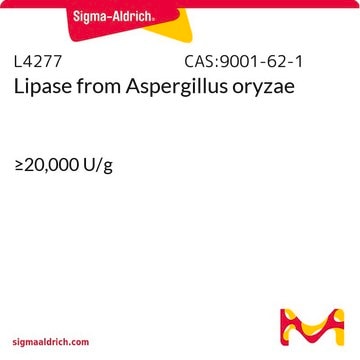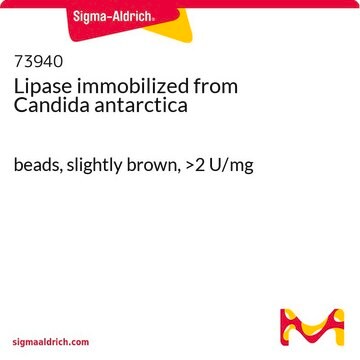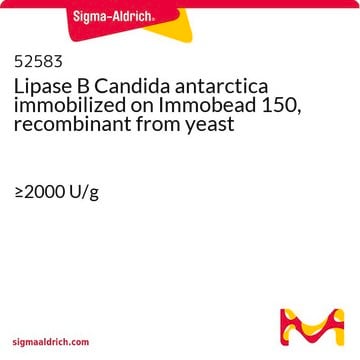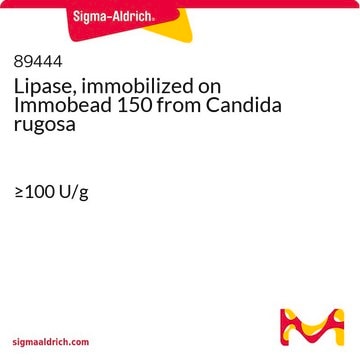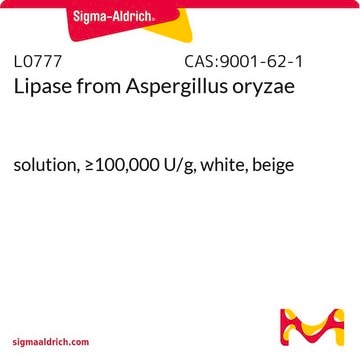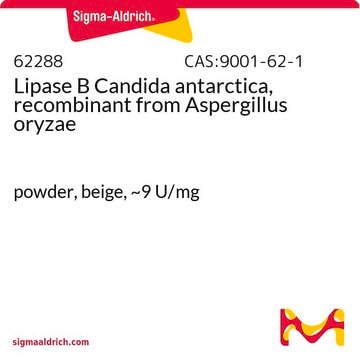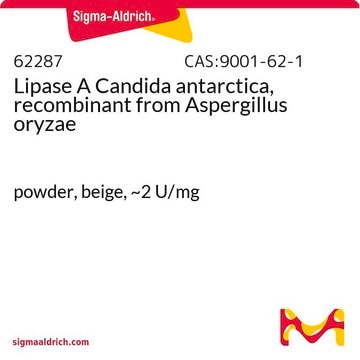52001
Lipase, immobilized on Immobead 150 from Rhizomucor miehei
≥300 U/g
Sign Into View Organizational & Contract Pricing
All Photos(1)
About This Item
UNSPSC Code:
12352204
NACRES:
NA.54
Recommended Products
biological source
fungus (Rhizomucor miehei)
form
powder
specific activity
≥300 U/g
storage temp.
2-8°C
Application
Lipases are used industrially for the resolution of chiral compounds and the transesterification production of biodiesel.
Biochem/physiol Actions
Lipases catalyze the hydrolysis of triacylglycerols into glycerol and free fatty acids.
The lipase cleaves ester bonds of triacylglycerols with the subsequent release of free fatty acids, diacylglycerols, monoacylglycerols and glycerol. It can also catalyze the reverse reactions when the aqueous medium is replaced by an organic or a biphasic aqueous/organic medium.
Unit Definition
1 U corresponds to the amount of enzyme which liberates 1 μmol butyric acid per minute at pH 7.5 and 40°C (tributyrin, Cat. No. 91010, as substrate)
Storage Class Code
11 - Combustible Solids
WGK
WGK 3
Flash Point(F)
Not applicable
Flash Point(C)
Not applicable
Personal Protective Equipment
dust mask type N95 (US), Eyeshields, Gloves
Certificates of Analysis (COA)
Search for Certificates of Analysis (COA) by entering the products Lot/Batch Number. Lot and Batch Numbers can be found on a product’s label following the words ‘Lot’ or ‘Batch’.
Already Own This Product?
Find documentation for the products that you have recently purchased in the Document Library.
Customers Also Viewed
Study of PLA pre-treatment, enzymatic and model-compost degradation, and valorization of degradation products to bacterial nanocellulose.
Sourkouni, et al.
World Journal of Microbiology & Biotechnology, 39, 161-161 (2023)
Kinetic studies on the Rhizomucor miehei lipase catalyzed esterification reaction of oleic acid with 1-butanol in a biphasic system
G.N. Kraai et al.
Biochem. Bioeng., 41, 87-94 (2008)
Ina Schoenfeld et al.
Biotechnology and bioengineering, 110(9), 2333-2342 (2013-03-28)
The use of enzymes as biocatalysts in organic media is an important issue in modern white biotechnology. However, their low activity and stability in those media often limits their full-scale application. Amphiphilic polymer conetworks (APCNs) have been shown to greatly
Our team of scientists has experience in all areas of research including Life Science, Material Science, Chemical Synthesis, Chromatography, Analytical and many others.
Contact Technical Service